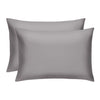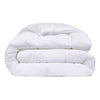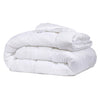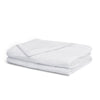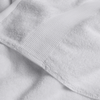The Daily Miracle
Is Sleep Apnea Genetic?
Published
July 02, 2021
Author
Nicholas Crusie

So your partner snores, and that really is a pain when all you want to do after a long day is cozy up for a peaceful, soothing sleep.
To you, this might be one of those things you put up with because they’re great in every other way.
But the issue of snoring isn’t only a pain for you. In fact, it might be a symptom of something more serious your partner is experiencing – sleep apnea.
Sleep Apnea is one of many conditions, including insomnia, restless leg syndrome, and narcolepsy, that are contributing to an epidemic of chronic sleep deprivation that we experience as a society.
Sleep is a serious business. We spend – or should spend – a third of our lives sleeping. This is because sleep gives our body and mind the chance to recharge so we can function properly in our waking hours.
The Two Types of Sleep Apnea
What is sleep apnea exactly? That’s a good question. Sleep apnea is an umbrella term for two conditions, Central Sleep Apnea (CSA) and Obstructive Sleep Apnea (OSA).
Both are characterized by a lack of normal breathing during sleep, which can cause a whole host of issues. Snoring is the most obvious, but others like headaches and even depression are common.
Read on to find out more.
Obstructive Sleep Apnea
OSA is caused by an overrelaxation of the throat muscles during sleep so that the throat totally or partially closes. As a result, breathing becomes shallower or is fully interrupted.
This is the most common form of sleep apnea, afflicting approximately 22 million Americans – more than Florida’s entire population!
Central Sleep Apnea
Unlike with OSA, this form of sleep apnea is caused by the brain failing to send the signals to the throat muscles to breathe. While the cause is different, it has a similar effect to OSA, hindering deep breathing or causing interruptions in breathing during sleep.
It’s important to note that mixed sleep apnea is also common, in which both OSA and CSA are combined.
Symptoms
Do you think you or a loved one have sleep apnea? Unless you have someone shoving you in the night and complaining about your snoring in the morning, it can be hard to identify this affliction.
However, if you have more than a couple of the symptoms indicated below, you might want to consider getting a diagnosis.
-
Waking up in the night: Your body wakes you up to ensure proper breathing.
-
Choking or gasping at night: This is your body’s reflex to the pause in oxygen flow.
-
Dry Mouth: Sleep apnea encourages breathing through the mouth (rather than the nose), making it dry.
-
Waking up tired: Interruptions in your breathing prevent you from having a good night’s sleep.
-
Finding it hard to concentrate: Fatigue from sleep apnea hinders your alertness.
- Memory loss: Sleep apnea disrupts rest time that’s crucial for memory consolidation.
Consequences of Sleep Apnea
Separate from the undesirable symptoms indicated here, sleep apnea has other serious consequences that make it worth your while to get a diagnosis. A study suggests that untreated sleep apnea can increase the risk of high blood pressure, high blood sugar levels, and stress hormones.
While it is unclear whether sleep apnea is responsible for diabetes and heart disease, studies show that they are conditions more common in those afflicted with this sleep disorder. This might also be due to the link between sleep apnea and obesity, diabetes, and heart disease.
Not to mention, sleep is so important to mental health. When we rest, it gives our body the chance to process and consolidate emotional information that helps us think more clearly and rationally.
Sleep apnea is suggested to heighten feelings of emotional distress, likely because it interrupts the deep sleep we need to function properly.
What’s more, sleep apnea can put others at risk by increasing the probability of road traffic accidents – often caused by overtired drivers falling asleep at the wheel.
Causes
You might be reading this thinking, “This explains a lot! Maybe I do have sleep apnea - but why have I been afflicted with this nighttime terror?”
Both types of sleep apnea – OSA and CSA – are acknowledged to be caused by a blend of genetics and lifestyle factors.
Knowing the causes might help you reduce the severity of your existing sleep apnea or prevent it all together.
Genetics
According to research, 40% of OSA can be linked to genetics. Obesity is one of the hereditary conditions that might inadvertently pass down OSA. This is because increased neck thickness and decreased muscle activity caused by fatty tissue can narrow the respiratory tract where breathing occurs.
Obesity is another epidemic that is plaguing the U.S. and other developed nations – meaning cases of sleep apnea are bound to increase.
While obesity is caused by a mix of genetic and environmental factors, certain lifestyle changes can mitigate its severity and lead to overall better health. Ironically, one way to reduce your risk of obesity is to get a good night’s sleep.
This is because poor sleep encourages the production of hormones that increase both appetite and a preference for foods rich in carbohydrates and fats. On the other hand, getting enough sleep helps produce leptin, a hormone that decreases appetite.
Other genetic causes of OSA are to do with physical features, such as a thick neck, a small lower jaw, a large tongue, and large tonsils that make your airway naturally narrower. Some of these are caused by obesity, but this is not always the case.
On the other hand, there is little evidence to suggest a link between CSA and genes. However, some studies suggest a link between hereditary heart issues and this sleep disorder.
Allergies
Another hereditary agitator of sleep apnea is allergies. Surprisingly, the bedroom hosts a surprising amount of allergens, including dust mites. Dust mites are pesky little bugs that feed off skin cells and thrive in warm, humid environments – like your mattress, especially after a night of hot sweats.
In one study, 41% of participants recalled experiencing night sweats in the past month.
Allergic reactions to dust mites and other agitators cause inflammation that might block your airways – contributing to OSA.
While there is little you can do to change your genetic proclivity to certain allergens – there are ways to reduce their prevalence in your bedroom environment.
Keeping It Cool and Clean
Dust mites love warm, humid environments – especially the nooks and crannies of your mattress. Depending on how old it is, your mattress can host from one to ten million dust mites!
Breathable bedding, which keeps you cool and dry, is your friend in the fight against OSA and allergy-related sleep interruptions.
The best fabric to ensure a cool and comfortable night’s sleep is Supima cotton because of its natural thermoregulating properties. Cooler sheets mean less bacterial growth and fewer dust mites in turn. Reduced humidity also lowers the likelihood of mold and mildew, which can also trigger allergies.
What’s more, a cool environment complements the body’s own thermoregulatory system – ensuring a doubly peaceful night’s sleep.
Miracle’s comforter is a great shield between your mattress and you. Not only is it incredibly soft and breathable, but it’s also naturally anti-bacterial thanks to infused pure silver, repelling bacteria and other microbes that dust mites thrive off.
Even better, it is made of lovely hypoallergenic cotton so that you can go to sleep confident your bedding won’t irritate you while you drift off to dreamland.
Breathe Easy
Sleep Apnea is a common issue that is becoming more prevalent in a society that is collectively more overweight and more prone to allergies. Combating sleep apnea depends on its cause.
Consider your genetic predisposition towards certain physical factors – weight, jaw size, neck width, tonsil size, as well as your susceptibility to allergies. Understanding why you have sleep apnea will help you take the right steps to prevent it.
Some cases are relatively harmless and can be improved with weight loss or improved sleep hygiene. However, other more serious cases might require medical diagnoses such as an at-home sleep test or a lab-administered test and a medical-based solution.
Common treatment options include Positive Airway Pressure Devices, which include a mask worn during sleep that provides pressurized airflow. If that seems too intense, there are some easy to wear oral appliances that might help reduce symptoms of sleep apnea.
Here at Miracle, we believe that being informed of your options is the best way to take control of your sleep quality!


